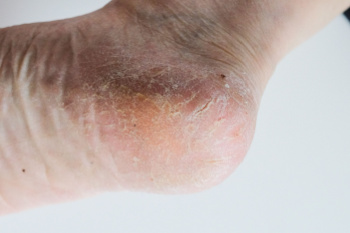
Cracked heels can stem from various factors, both medical and environmental. Dry skin, prolonged standing, wearing ill-fitting shoes, and dehydration can contribute to this common condition. Additionally, medical conditions like eczema, psoriasis, or thyroid disorders can exacerbate heel cracking. Symptoms may include pain, itching, redness, and deep fissures, increasing the risk of infection. Prevention is key to managing cracked heels. Podiatrists offer specialized care to address underlying causes of cracked heels, treat complications, and provide personalized advice for maintaining foot health, ensuring optimal comfort and mobility. If you have severely cracked heels or have diabetes, it is strongly suggested that you seek treatment from a podiatrist.
If the skin on your feet starts to crack, you may want to see a podiatrist to find treatment. If you have any concerns, contact Mack Jay Groves IV, DPM from Practice. Our doctor can provide the care you need to keep you pain-free and on your feet.
Cracked Heels
It is important to moisturize your cracked heels in order to prevent pain, bleeding, and infection. The reason cracked heels form is because the skin on the foot is too dry to support the immense pressure placed on them. When the foot expands, the dry skin on the foot begins to split.
Ways to Help Heal Them
- Invest in a good foot cream
- Try Using Petroleum Jelly
- Ease up on Soaps
- Drink Plenty of Water
Ways to Prevent Cracked Heels
- Moisturize After Showering
- Skip a Shower
- Keep Shower Water Lukewarm
- Don’t Scrub Your Feet
If you are unsure how to proceed in treating cracked heels, seek guidance from a podiatrist. Your doctor will help you with any questions or information you may need.
If you have any questions, please feel free to contact our office located in Covington, LA . We offer the newest diagnostic and treatment technologies for all your foot care needs.
